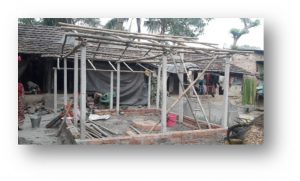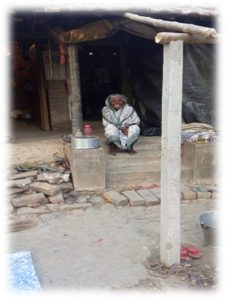Dr Valerie Lipman is Honorary Research Fellow and Chair of the Patient and Public Involvement and Engagement Advisory Group at the NIHR Policy Research Unit in Health and Social Care Workforce, King’s College London.[i] (1,198 words)
We celebrate International Women’s Day 2021 with a story of an intergenerational project between young girls and older women in West Bengal, India and their global links with European feminists. As a result of the extraordinary determination and struggle of a group of girls, over a hundred homeless older women living in cyclone flooded and Covid-affected villages in the Bay of Bengal region, India will be moving into homes which have been especially designed and built for them.
In May last year the Amphan Cyclone in the Sundarbans in West Bengal wrought destruction in this area not witnessed for about 50 years. Already reeling from the Covid pandemic, thousands of people lost their livelihoods, homes and lives. Families were destroyed and as a local worker said: ‘The old village tradition of living with each other together has now become a fairy tale’. Older people were left isolated with no one to look after them and older women who have no rights to land ownership or their own housing in this area, were left particularly stranded. The commonly held view locally was to prioritise those struggling to support their younger families, rather than help people nearing the end of their lives.
However, a group of young girls in the area got together to help some of those older women, or ‘Grannies’[ii] as they are termed. The Girls Group leaders demanded that the ‘Grannies’ receive some money from the Panchayat[iii] for constructing their houses. A spokesperson from NISHTHA[iv], a West Bengal women’s programme supported this work highlighted the difficulties facing older women: ‘The social Patriarchal rules are still so strong that [] grannies are even deprived from getting their own rights. Hence, they don’t have any property, money, etc. As they don’t have any piece of land in their name, they don’t get any help from the Panchayat to construct their house. They persuaded the Panchayat and convinced them to give 9500 rupees for the charge of the skilled labourers’.
Background to the project
The ongoing Covid Pandemic had raised both fear and havoc among local populations as well as severely affected people’s livelihoods. On the one hand there was the challenge to combat Covid, while on the other lockdown prevented a population mostly involved in construction related jobs (welder, fitter, etc) from earning a living. As the only source of income through which they maintained their families these people became absolutely penniless during lockdown. As a result, many had no food to eat nor a place to live. ‘Single Mother, Destitute Old and Disabled people were among the most unfortunate as there were not even anyone to stay besides them’. At this moment Nishtha and its groups, who were already working in more than 300 villages in the area, began to gather local support to collect and distribute rice, vegetables and other essentials to those who were the most distressed.
The situation went absolutely out of control after severe cyclone Amphan hit South 24 Parganas, on May 16, 2020. Reported as causing ‘the biggest destruction the people have ever seen, people already surviving without food, [] even lost the roof over their head. People dwelling in the coastal areas faced the severity of Amphan the most. They lost everything, there were massive damages of homes and uprooting trees and electric poles. Many people were killed; most of the fatalities were due to electrocution or the collapse of homes. Moreover, in the areas of South 24 Parganas, innumerable breaches occurred in the embankments that led to the flooding of villages, swathes of cropland and entry of saline water from seas. According to the official estimate, over ten lakh houses collapsed and around four lakh farmers have been affected in this district alone. It took almost a week to fifteen days for power supply and drinking water to be restored in parts of southern West Bengal. Still now there’s havoc among the people as the situation hasn’t got normalized.’
Activities of Argha, support a granny project:
While working on all these activities the Girls’ Group came across the poor condition of the single mothers and destitute old grannies. These ‘little warriors’ arranged rations and food items from different places and approached Nishtha to come up with possible support for them.
Through contacts with their women friends in Germany and England they together arranged a huge fund to help building houses and latrines, and other household materials, for thirteen homeless ‘old grannies’ who had not received any support from the Panchayat.

The group turned towards the Panchayat for help, convincing them to provide them the money for those skilled laborers. These destitute old grannies don’t get money for constructing their house from the authority; and the authority has no right to neglect them. They persuaded them by saying that they too are the voters.
The ecologically friendly homes, designed by a young woman architect specifically for the older women of this village, are almost complete. Each house has one room and a latrine, of either 10×15 or 15×18 feet. Because of termites the houses will be constructed on brick-built plinths, with bamboo fences, and because of heavy rains the roofs will be of tin rather than the traditional earthen roof tiles. The land on which the houses ‘has been given with written permission to the grannies – they now own the land their house is on and cannot be forced to vacate it’. Every ‘Granny’ has also been provided with a bank account, into which the Gram Panchayat authority has deposited some money.
The achievements of this group of young women is immense
 ‘The 13 grannies who had to live below the broken shade and house made of polythene, can feel themselves wanted and live in a good house with toilets before they say their final good-bye to this mighty world. At the end of their life, they have got such safe haven for the first time in their life. This project has created a marvellous opportunity for these girl leaders to help more than 100 grannies of their community by raising funds’.
‘The 13 grannies who had to live below the broken shade and house made of polythene, can feel themselves wanted and live in a good house with toilets before they say their final good-bye to this mighty world. At the end of their life, they have got such safe haven for the first time in their life. This project has created a marvellous opportunity for these girl leaders to help more than 100 grannies of their community by raising funds’.
The project holders applaud the young women for:
- mobilising their village people and its neighboring villagers
- visiting households amidst Covid pandemic to ensure that those people abide the Covid protocol and don’t look down upon at those who are Covid affected.
- establishing a strong faith among people with their leadership abilities, dedication, transparency, etc., and shown that even girls can do it.
- taking on the Panchayat and getting them to provide the tin roofs and other monies to construct for the houses for the grannies.
These young girls played the role of the frontline service providers. Their only weapon in this war front was their bicycle. They left no stone unturned. They also got the support of the Police and local Panchayat. Their non-violent communication, innovative ideas and efforts to minimize the conflicts show their abilities of being a good leader. The whole community is moved with the dedication of these young warriors.
On this International Women’s Day we celebrate the achievements of this group of young women who helped more than 100 older women in their communities and built 13 new homes for a group of homeless older women.
Dr Valerie Lipman is Honorary Research Fellow at the NIHR Policy Research Unit in Health and Social Care Workforce, King’s College London.
[i] The substance of this blog is taken from a report written by the Director of NISHTHA February 2021.
[ii] Grannies – is a common title applied to older women, it does not necessarily denote being a grandparent
[iii] Panchayat – local government body
[iv] NISHTHA – West Bengal voluntary organisation, established 40 years ago, that promotes and develops the rights and skills of girls and women.
Many thanks go to Rajashiri Dasgupta a feminist activist in Kolkata who has been the link between the projects in India and between India and the friends in Europe.